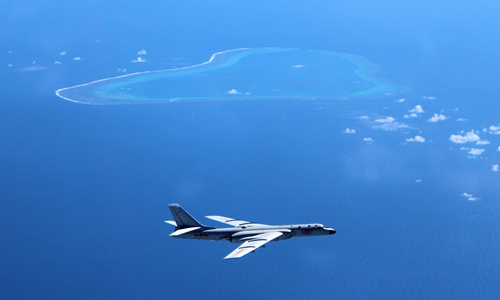HOME >> OPINION
Jakarta shouldn’t misinterpret Beijing’s restraint
By Cheng Hanping Source:Global Times Published: 2020/1/21 22:25:43

A Chinese H-6K bomber patrolling islands and reefs including Huangyan Dao in the South China Sea. File photo: Xinhua
The year 2020 started with a standoff lasting days between China and Indonesia in the South China Sea. Beijing sent Coast Guard vessels while Indonesia deployed various warships to the contentious water body. Following the standoff, Indonesian President Joko Widodo asked Japan on January 10 to invest more in the Natuna Islands, which are located on the southern tip of the South China Sea. Indonesian Foreign Minister Retno Marsudi said Indonesia and Japan had also "agreed to strengthen coast guard coordination."In recent years, China and Indonesia have generally maintained friendly ties. Beijing has never claimed sovereignty over the Natuna Islands.
However, some people from the Indonesian military and political circles claimed that China's Coast Guard vessels and fishing trawlers had entered Indonesia's exclusive economic zone around Natuna Islands several times since December 2019, causing strong resentment from the Indonesian side.
Not long after Widodo was sworn in for a second term on October 20, 2019, Indonesia was hit by severe floods, which killed at least 67 people and left hundreds of thousands homeless. The sluggish response of the Indonesian government led to chaos during rescue and relief operations, angering the victims and their kin.
To shift domestic attention and ward off political pressure, Widodo's government hyped up the South China Sea issue.
In June 2016, Widodo held a cabinet meeting aboard a warship near the Natuna Islands. His visit to the islands along with his chief security minister, foreign minister and military chief was seen as a political gimmick. It showed that Indonesia is far from being a major political power although it has a population of over 260 million spread across more than 10,000 islands.
In addition to domestic elements, Jakarta has also made mistakes in judging the situation outside the country. First, Jakarta naively believes it has finally got the chance to pressure China to make concessions in the disputed waters in the South China Sea amid escalating tensions between Beijing and Washington as well as the gradual implementation of the US' Indo-Pacific Strategy. That is why Widodo wants to invite Japan to invest more in the Natuna Islands.
Second, it believes that Vietnam, which assumes the rotating presidency of ASEAN in 2020, will use the chance to embarrass China by hyping up the South China Sea issue.
Third, Indonesia thinks it can take advantage of the US-launched trade war against China, the Hong Kong situation and the Taiwan question, which have put Beijing under pressure, to test China's bottom line by showing a tough stance.
Fourth, Jakarta believes that Beijing will refrain from use of military force when negotiations on the Code of Conduct in the South China Sea are at a crucial phase.
China has been restrained in the standoff with Indonesia on the South China Sea. China has referred to consultations and dialogues rather than confrontation to settle the disputes. Foreign Ministry spokesperson Geng Shuang said on January 7 that "China and Indonesia have been in communication with each other through diplomatic channels," and that both countries "shoulder the important task of safeguarding regional peace and stability."
However, Jakarta mistook Beijing's restraint as weakness, misunderstood China's good intentions and thus went too far in the wrong direction. We can see this in Widodo's recent visit to a military base in the Natuna Islands and the deployment of fighter jets in Natuna.
It should not be overlooked that China's Coast Guard vessels are the most powerful among their kind in Southeast Asia. It could lead to severe consequences and even result in a crossfire if Indonesia wants to oust China's Coast Guard and fishing vessels by force. Moreover, China's fighter jets are always on standby on the nearby islands of Meiji and Yongshu. Therefore, no country should underestimate or misjudge China. As President Xi Jinping has said, "No one should expect us to swallow the bitter fruit that is harmful to our sovereignty, security or development interests."
China is willing to properly manage its differences with Indonesia through talks, and hopes that Jakarta can bear in mind the bigger picture of regional stability and properly resolve the differences with Beijing.
To display aggression or even use military force is not the key to solving the issue of overlapping territorial claims, as both China and Indonesia are authorized by relevant international laws to administer the disputed waters. If both sides eye only their own interests and go overboard, they would worsen the disputes instead of resolving them.
Therefore, setting aside disputes and pursuing joint development should be the real way out. The intergovernmental joint steering committee on oil and gas cooperation set up by China and the Philippines in August 2019 could be a sound example of how China and Indonesia can settle their differences.
The author is senior research fellow and professor at the Collaborative Innovation Center of South China Sea Studies, Nanjing University. opinion@globaltimes.com.cn
Posted in: ASIAN REVIEW